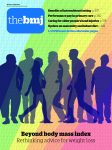
Lived experience: from intention to global action
- Sophia Walker, patient editor1,
- Mark Barone, founder2,
- Ashley H Ng, lived experience research fellow3
1Patient author, The BMJ
2Patient author, Intersectoral Forum of Chronic Non-Communicable Conditions in Brazil, São Paulo, Brazil
3Patient author, Monash Centre for Health Research and Implementation, Monash University, VIC, Australia
- Correspondence to: S Walker sophia.walker{at}bmj.com
It is indisputable that people should have a say in the healthcare decisions that affect them. “Lived experience”—knowledge gained by being a patient, care giver, or relative — is increasingly recognised by clinicians, policy makers, researchers, and the public as essential expertise to ensure that healthcare is relevant, responsive, effective, resilient, equitable, and fully inclusive.12 The BMJ Collection on Lived Experience as Expertise highlights some of the ways that lived experience has helped improve care (www.bmj.com/collections/lived-experience).
There is much to celebrate, particularly a growing expectation that clinical research should be conducted with patients and not on them. Funders, including the US Patient Centred Outcomes Research Institute, the UK National Institute for Health and Care Research, Medical Research Future Fund in Australia, and the Canadian Institutes for Health Research, are encouraging or requiring “patient engagement” or “consumer involvement.” The BMJ requires authors to document in research submissions if and how they involved patients and the public.3
In policy development, progress has been more piecemeal. In the US, incorporating lived experience in drug regulation is a legal obligation under the 2012 Food and Drug Administration Safety and Innovation Act, a legacy of HIV/AIDS activism.4 The UK’s Medicines and Healthcare Products Regulatory Agency’s strategy involves patients “in every step of the regulatory journey.”5 Brazil’s new Law 15.120/2025 mandates the inclusion of people with lived experience in decision making about drugs for the public health system.6
High income countries are over-represented among published examples of inclusion of lived experience as expertise. Exemplars from lower income countries need more attention,7 such as the Movement for Global Mental Health, a network of organisations working with communities to close treatment gaps.8
Making patient involvement routine
Radical change is needed for disparate and ad hoc initiatives to become “business as usual” at every level of healthcare, policy, and research decision making, and for patients, care givers, and relatives to be valued equally to other experts. To this end, the World Health Organization (WHO) created a practical guide to including lived experience in healthcare: the 2023 framework for meaningful engagement of people living with non-communicable diseases (NCDs), mental health and neurological conditions.9 This is one of four WHO reports co-created with people with lived experience setting the expectation that nothing about people with a health condition should be decided without their involvement.10111213 Last year’s World Health Assembly (WHA) passed a resolution that commits governments to empower and fund people, communities, and civil society to participate in decision making processes at all levels of the health system,14 and governments must show progress every two years.15
To make participatory approaches business as usual brings challenges.16 The key is dismantling the cultural barriers that deny lived experience the same respect as technical knowledge.1718 Participatory approaches require power to be rebalanced. It is essential to re-imagine—or at least be open to—a new definition of what it means to be an expert and what it means to hold authority. Pioneering institutions, leaders, and individuals are learning as they go, with lessons to apply globally.1719
Journals should do more to set expectations and standards to advance the movement, developing formal strategies for working with patients and the public. The BMJ launched its patient and public partnership strategy in 2014.20
Co-creation has become a buzzword. But paying lip service to the value of lived experience while existing knowledge structures remain is not enough. Involving people with lived experience is just the first step on this culture change. It can be tempting to bring in one or two lived experience experts and think the work is done.21 But this risks reinforcing existing power structures through tokenism and tailoring healthcare to a few individuals. A truly participatory approach to decision making needs the inclusion of everyone, especially hardly reached populations who have historically been excluded, as the WHA resolution recognises. This is critical to identify biases and gaps in healthcare at the population level that undermine progress towards improving outcomes
The growing number of examples of patient inclusion, the WHO framework for meaningful engagement, and the resolution on social participation show that national and global stakeholders are serious about making co-creation of healthcare not just a talking point but a reality. The new BMJ collection showcases the value, competency, and capability of people with lived experiences in improving healthcare and health. Health leaders at all levels have the elements to make participatory healthcare business as usual.
Footnotes
-
Competing interests:The BMJ has judged that there are no disqualifying financial ties to commercial companies. The authors declare the following other interests: SW worked at the Juvenile Diabetes Research Foundation UK, a type 1 diabetes charity, from 2020 to 2022. MB is advisory committee member, Life for a Child International; scientific advisory board member, International Alliance of Patients’ Organizations; commissioner for the Lancet Global Health Commission on People-Centered Care for Universal Health Coverage; steering committee member, NCD Laboratory and Meaningful Engagement (GCM-WHO); former vice president and honorary member of Brazilian Juvenile Diabetes Association, former vice president of the International Diabetes Federation. MB participated in the informal consultations to PLWNCDs by WHO for their development of the four reports on meaningful engagement, including the framework. AHN is project manager for an Australian government funded research project on how to improve national adoption of consumer and community involvement in health and medical research and healthcare improvement in health services; funding ceased in March 2025. Further details of The BMJ policy on financial interests are here: https://www.bmj.com/sites/default/files/attachments/resources/2016/03/16-current-bmj-education-coi-form.pdf
-
Provenance and peer review: Commissioned; not externally peer reviewed.
This is an Open Access article distributed under the terms of the Creative Commons Attribution IGO License ( which permits use, distribution, and reproduction for non-commercial purposes in any medium, provided the original work is properly cited.


